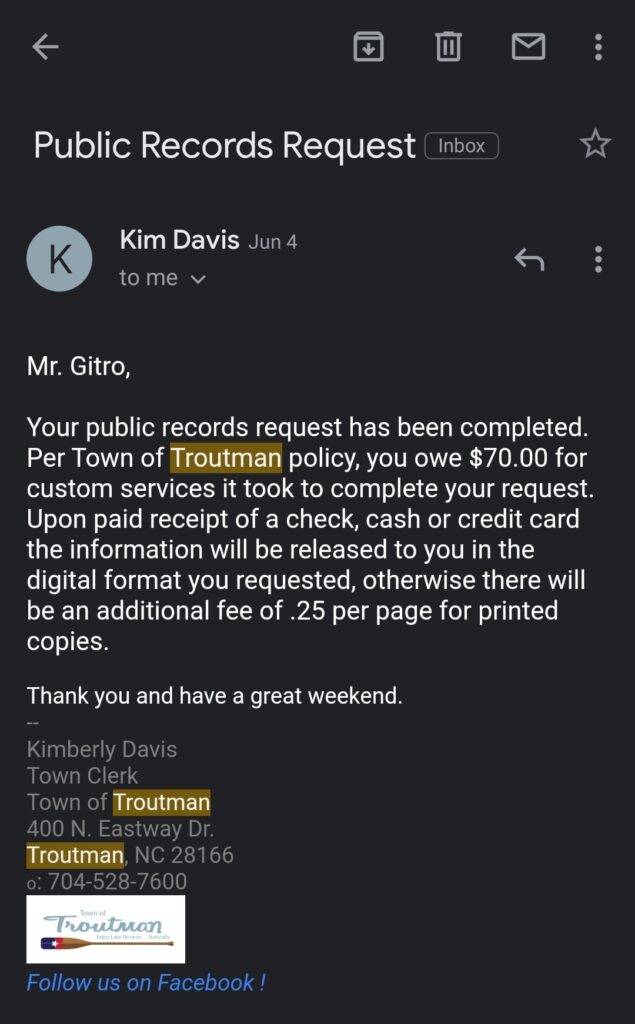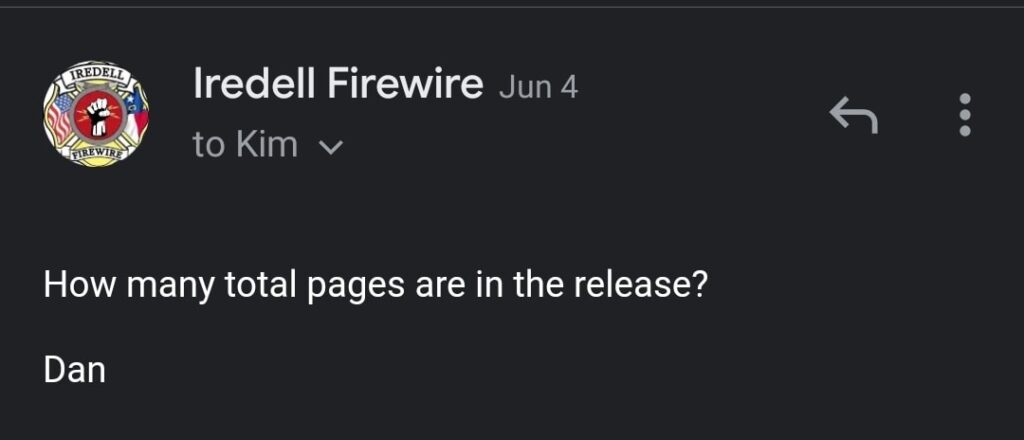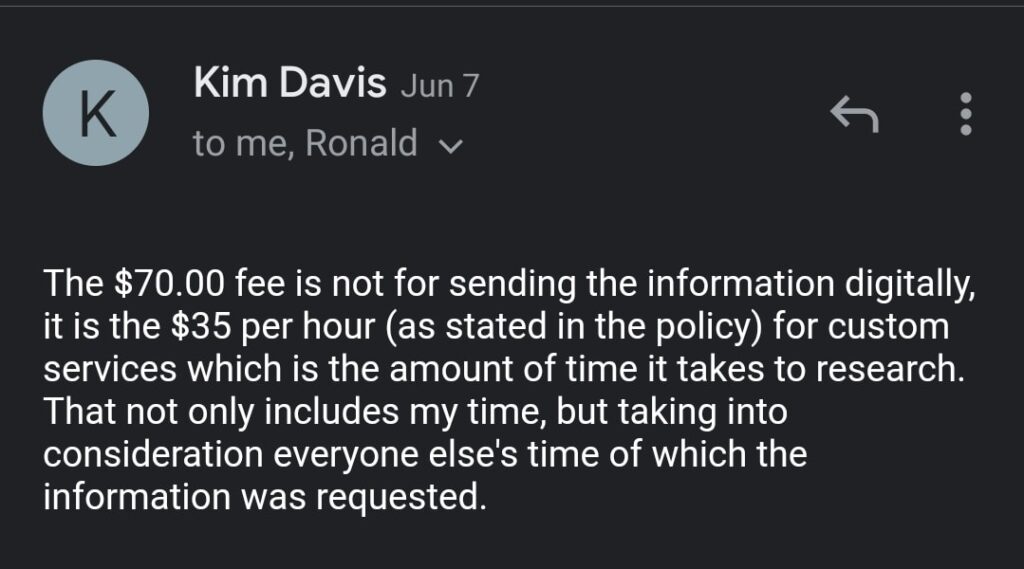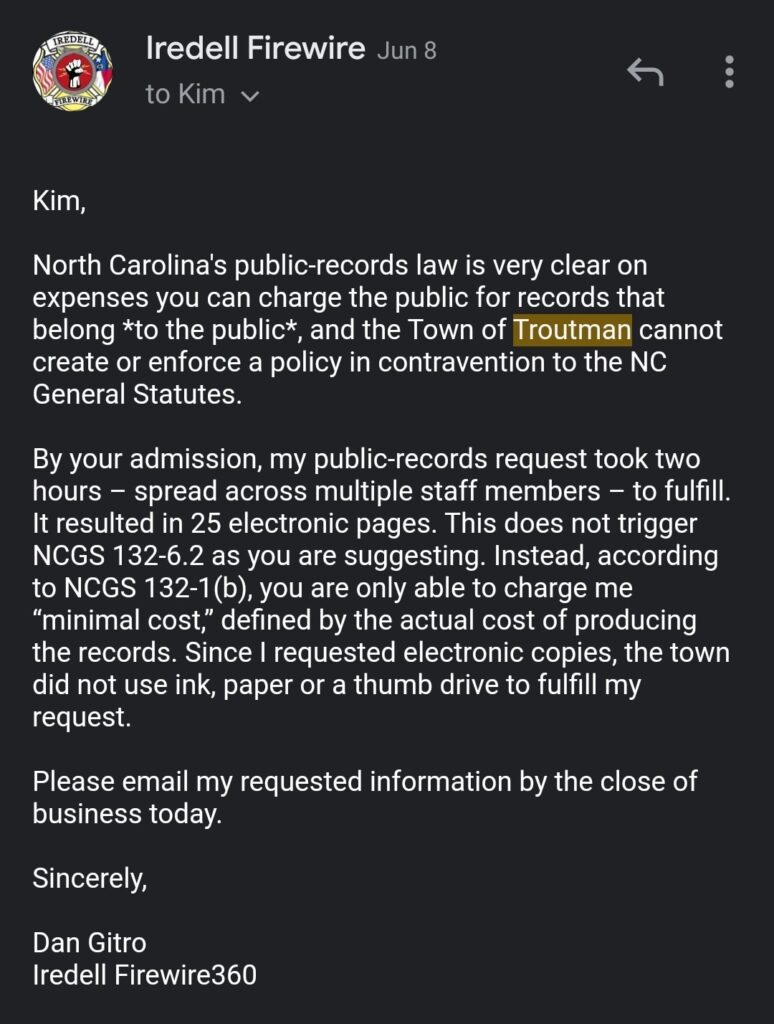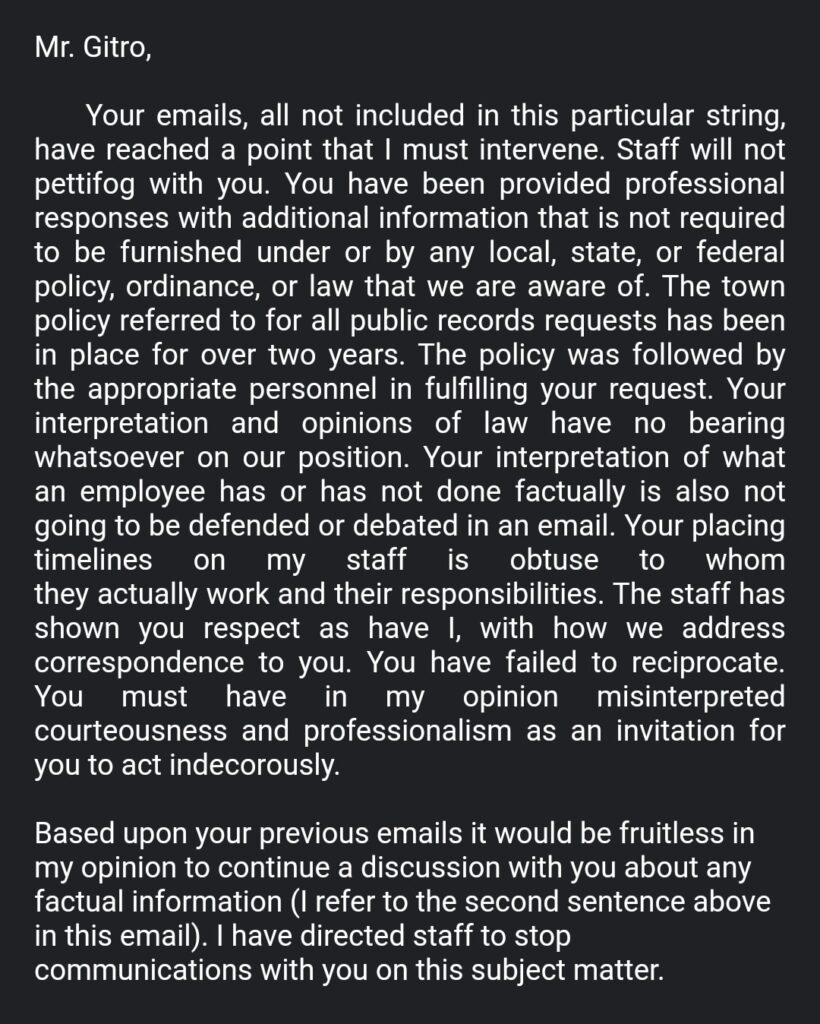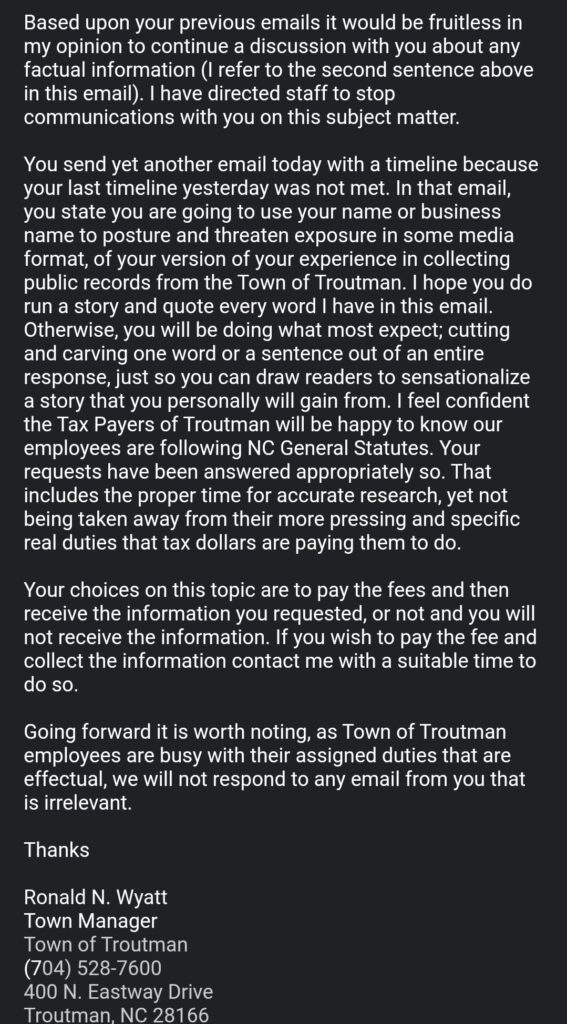The Town of Troutman is breaking the law by withholding public records from an Iredell County taxpayer.
The town is holding the records hostage until Mooresville resident and Iredell Firewire Founder Dan Gitro coughs-up $70 to pay for two hours of staff time the town says it took to fulfill Gitro’s request for public documents.
But since 2019, Troutman has fulfilled two other requests – including one recently from the Scoop and a large request from a Concord law firm – without collecting compensation for staff time.
Gitro, whose Iredell Firewire Facebook page boasts 35,000 followers and dabbles at times in local-government matters, said Troutman is treating him differently because of politics. “I think the Town of Troutman – specifically Town Manager Ron ‘Duck’ Wyatt – is withholding information from me because he has a personal vendetta against the Iredell Firewire for questioning why police officers, including a chief, are leaving Troutman in droves,” Gitro said in a message to the Mooresville Scoop this week.
Gitro said he also believes Wyatt is singling him out “for questioning some of his cronies, specifically PACT (Police and Community Together), due to their questionable pasts.” PACT is a community organization that claims to aim to foster relationships between police and Iredell and/or North Carolina residents.
Brooks Fuller, director of the N.C. Open Government Coalition, said that would run afoul of state law and the U.S. Constitution. “Public officials are not permitted to discriminate against citizens on the basis of viewpoint by burdening some citizens with fees for public records,” Fuller said. “That would be a gross violation of the public records law and the First Amendment.
“I hope that’s not happening.”
State law allows government entities to charge the public for staff-time spent on public records only when requests “require extensive use of information technology resources or extensive clerical or supervisory assistance by personnel.”
Otherwise, the law is clear: Public records are the property of the people, and the people are entitled to access public records for “free or at minimal cost.” The law defines “minimal cost” as “the actual cost of reproducing the public record or public information.” In other words, the law allows the town to charge for the actual cost of ink and paper – or, if the records are produced on a disk or thumb-drive, the town can charge for those actual material costs.
Troutman adopted its own public records policy – “Policy #52” – on Jan. 10, 2019. It goes beyond what state law allows by charging an hourly $35 fee for what the policy describes as “custom services.” The policy does not define “custom services,” which is also not provided for in the public records law. Instead, Troutman’s policy cites the provision of the state public records law governing fees that may be charged for “excessive” requests.
While it took almost two full months for the town to notify Gitro that his request was fulfilled, Town Clerk Kim Davis acknowledged that the request, itself, took only two hours, spread across multiple staff members, to complete. She also said the request resulted in 25 “digital pages,” as Gitro had requested.
In other words, the town incurred no expenses to fulfill the request.
Advocates for open government agree the state’s statute about special service charges is somewhat vague on what qualifies as “extensive use of information technology.” But the Town of Troutman, itself, reveals its interpretation in – ironically – public records that were recently obtained by the Scoop.
According to town documents, other than the recent request from the Scoop about the number of public-records requests the town has filled, Troutman has fulfilled just one other public records request since the inception of “Policy #52.” Scarbrough, Scarbrough & Trilling, PLLC, a law firm in Concord, made a request last year that, according to a town invoice, required 14 hours of staff time and cost the town $451.33 in paper copies, mileage to make copies, and a flash drive and two CDs. The town also invoiced $490 for the staff time spent on the request: 14 hours at $35/hour.
The firm shut that down.
“We will pay $451.33, which includes the PostNet charge, mileage to PostNet, and the CDs and flash drives,” John F. Scarbrough wrote in a Feb. 9, 2021 email to Troutman Town Attorney Gary Thomas.
Thomas replied: “Troutman will accept your offer of $451.33.”
So in a nutshell: A law firm received its records without compensating Troutman for time that staff spent on a public-records request that ate-up 14 hours of staff time and cost $450 in material costs. The Scoop also obtained its public records without being charged for staff time. But town officials are withholding 25 pages of electronic records that took two hours and cost exactly zero dollars to compile for an Iredell resident.
We sent an email to Davis, asking why Gitro was charged for public records when the Scoop and the Concord law firm were not. It went unanswered.
She also did not respond to questions about who in Troutman, specifically, decides what is considered “extensive” resources and labor and, thus, which member of the public will be charged – and which will not.
Gitro, unsuccessfully, attempted to reason with the town once Davis informed him that his records were ready. Gitro was courteous but curious about why the town was attempting to charge him “$3 per digital page” of public records. He asked – again – for the town to send him his prepared records at-cost, which – as defined by law and Davis’ own admissions – should have been free.
That’s when Wyatt interjected himself, showing his support for “Policy #52,” which the town adopted before naming Wyatt manager.
Wyatt told Gitro staff would no longer “pettifog” with him, accusing him of acting “indecorously.”
In his diatribe, Wyatt wrote: “Your interpretation and opinions of law have no bearing whatsoever on our position. Your interpretation of what an employee has or has not done factually is also not going to be defended or debated in an email. Your placing timelines on my staff is obtuse to whom they actually work and their responsibilities.
“Your choices on this topic are to pay the fees and then receive the information you requested, or not and you will not receive the information” Wyatt wrote. “Going forward it is worth noting, as Town of Troutman employees are busy with their assigned duties that are effectual, we will not respond to any email from you that is irrelevant.”
The Scoop’s public-records request followed soon after Wyatt’s email to Gitro. Like Gitro, the Scoop asked for records to be provided by a particular date. The town obliged in a reasonable amount of time, furnishing the records at no cost and with no accompanying correspondence from Wyatt.

